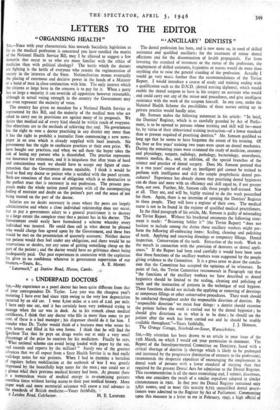" ANCILLARY DENTISTS "
The dental profession has been, and is now more so, in need of skilled assistance and qualified ancillaries for the treatment of minor dental affections and for the dissemination of health propaganda. Far from lowering the standard of treatment or the status of the profession, the employment of skilled assistants, hygienists or nurses would do more than anything else to raise the general standing of the profession. Actually I would go very much further than the recommendations of the Teviot Report. I would introduce a course of study and training ending with a qualification such as the D.N.D. (dental nursing diploma), which would enable the dental surgeon to have in his surgery an assistant who would and could carry out any of the minor oral procedures, and give intelligent assistance with the work of the surgeon himself. In any case, under the National Health Scheme the possibilities of these nurses setting up in private practice would hardly arise.
Mr. Samson makes the following statement in his article: " In brief, the Dentists' Register, which is so carefully guarded by Act of Parlia- ment, is to be opened to persons whose training and skill will be—must be, by virtue of their abbreviated training instruction—of a lower standard than at present required of practising dentists." Mr. Samson qualified so long ago that he seems to have forgotten the extent of his training. Of the four or five years' training two years were spent on dental mechanics.
During the remaining years were crammed the study of medicine, anatomy and physiology, surgery, radiology, pathology, bacteriology, anaesthesia, materia medica, &c., and, in addition, all the special branches of the science and practice of dental surgery. Does Mr. Samson pretend that in a two years' course of study an intelligent girl cannot be trained to perform with intelligence and skill the simple prophylactic dental pro- cedures? Experience has already shown that practising dental hygienists can do these and more with an efficiency and skill equal to, if not greater than, our own. Further, Mr. Samson calls these people half-trained. Not at all. They are, and will be, highly trained to do the work prescribed
for them. Again, there is no intention of opening the Dentists' Register to these people. They will have a register of their own. The medical nurse is not to be found in the register of qualified medical practitioners. In the third paragraph of his article, Mr. Samson is guilty of misreading the Teviot Report. Without his bracketed comments the following state- ment is made: " Becoming bolder it " (the Teviot Report) "does not hesitate to include among the duties these ancillary workers might per- form the following all-embracing items: Scaling, cleaning and polishing of teeth. Applying and renewing dressings or temporary fillings. Dental inspection. Conservation of the teeth. Extraction of the teeth. Work in the mouth in connection with the provision of dentures or dental appli- ances." If the Report had been read carefully it would have been seen that these functions of the ancillary workers were suggested by the people giving evidence to the Committee. It is a gross error to draw the conclu- sion that the Committee has accepted the opinions of its witnesses. In point of fact, the Teviot Committee recommends in Paragraph 192 that "the functions of the ancillary workers we have described as dental hygienists should be limited to the scaling, cleaning and polishing of teeth and the instruction of patients in the technique of oral hygiene. These functions should not include the applying or removing of dressings or temporary fillings or other conservative procedures. Their work should be conducted throughout under the responsible direction of dentists. By `responsible direction' we mean four things: a dentist should examine the patient before the work is carried out by the dental hygienist ; he should give directions as to what is to be done ; he should see the patient after the work has been carried out and he should be readily
available throughout."—Yours faithfully, J. J. Hopson. The Grange Cottage, Newbold-on-Stour, Warwickshire.






























 Previous page
Previous page